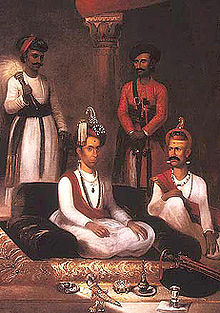
BALAJI VISWANATH
(1719-1720)
He excelled in diplomacy and won many Martha chiefs to the side of Shahu. Shahu honoured him with the title of ‘Sena Karte’ in 1708, and made him Peshwa in 1713. The Peshwa concentrated all the powers in his office. He became the functional head of the Maratha Empire.
Founder of the Peshwa Dynasty: Appointed by Chhatrapati Shahu, he laid the foundation for the Peshwa's authority.
He concluded an agreement with the Sayyid brothers, by which the Mughal emperor (Farrukhsiyar) recognized Shahu as the king of Swarajya.
He also helped the Sayyid brothers in overthrowing Farrukhsiyar.
BAJI RAO
(1720-1740)
He was a bold and brilliant greatest exponent in guerilla tactics after Shivaji. Martha power reached its zenith under him.
Under his leadership, the Marathas compelled the Mughals first to give them the right to collect chauth of the vast areas and then to cede those areas to the Maratha kingdom.
He conquered Salsette and Bassin from the Portuguese in 1733. He also defeated the Nizam-ul-Mulk near Bhopal and concluded the treaty of Durai Sarai, via which he got Malwa and Bundelkhand (1737).
BALAJI BAJI RAO (NANA SAHIB)
(AD 1740-1761)
In an agreement with the Mughal emperor (Ahmed Shah), the Peshwa to protect the Mughal empire from internal and external enemies in return for the chauth.
In the Third Battle of Panipat in 1761, between Maratha and Ahmed Shah Abdali, Viswas Rao, the son of Nana Sahib died.
PESHWA MADHAV RAO I (AD 1761-1762)
Balaji Baji Rao was succeeded by his younger son Madhav Rao I. Raghunath Rao, the eldest surviving member of the Peshwa family, became regent to the young Peshwa and de-facto ruler of the state.
After the death of Madhav Rao, Peshwaship had lost its all power.
LATER PESHWAS
Narayan Rao (1772-73)
Sawai Madhav Rao (1773-95)
Baji Rao II (1795-1818)
Last Peshwa: His tenure saw the decline of Peshwa power and the eventual defeat by the British in the Third Anglo-Maratha War (1817–1818).
Treaty of Bassein (1802): Signed a subsidiary alliance with the British, which led to increased British influence and control over the Maratha territories.
End of the Peshwa Era: After his defeat, the British deposed him and abolished the Peshwa position, integrating Maratha territories into the British Empire.
ANGLO MARATHA WARS
1ST Anglo Maratha War (1775-82): Important Treaties – convention of Wadgaon (1779) and treaty of Salbai (1782)
2nd Anglo Maratha War (1803-06):
Began when Maratha Peshwa signed the subsidiary Alliance Treaty of Bassein.
Martha army defeated by British
3rd Anglo Maratha War (1817-18): Lord Hastings declared war against Pindaries the mercenary of the world that Marathas decisively defeated.
The Peshwas were prime ministers and later de facto rulers of the Maratha Empire in India. Here is a list of the most notable Peshwas, along with key points about their contributions and significance:
